José Pombal
EuroLLM-22B: Technical Report
Feb 05, 2026Abstract:This report presents EuroLLM-22B, a large language model trained from scratch to support the needs of European citizens by covering all 24 official European Union languages and 11 additional languages. EuroLLM addresses the issue of European languages being underrepresented and underserved in existing open large language models. We provide a comprehensive overview of EuroLLM-22B's development, including tokenizer design, architectural specifications, data filtering, and training procedures. Across a broad set of multilingual benchmarks, EuroLLM-22B demonstrates strong performance in reasoning, instruction following, and translation, achieving results competitive with models of comparable size. To support future research, we release our base and instruction-tuned models, our multilingual web pretraining data and updated EuroBlocks instruction datasets, as well as our pre-training and evaluation codebases.
MindGuard: Guardrail Classifiers for Multi-Turn Mental Health Support
Feb 01, 2026Abstract:Large language models are increasingly used for mental health support, yet their conversational coherence alone does not ensure clinical appropriateness. Existing general-purpose safeguards often fail to distinguish between therapeutic disclosures and genuine clinical crises, leading to safety failures. To address this gap, we introduce a clinically grounded risk taxonomy, developed in collaboration with PhD-level psychologists, that identifies actionable harm (e.g., self-harm and harm to others) while preserving space for safe, non-crisis therapeutic content. We release MindGuard-testset, a dataset of real-world multi-turn conversations annotated at the turn level by clinical experts. Using synthetic dialogues generated via a controlled two-agent setup, we train MindGuard, a family of lightweight safety classifiers (with 4B and 8B parameters). Our classifiers reduce false positives at high-recall operating points and, when paired with clinician language models, help achieve lower attack success and harmful engagement rates in adversarial multi-turn interactions compared to general-purpose safeguards. We release all models and human evaluation data.
EuroLLM-9B: Technical Report
Jun 04, 2025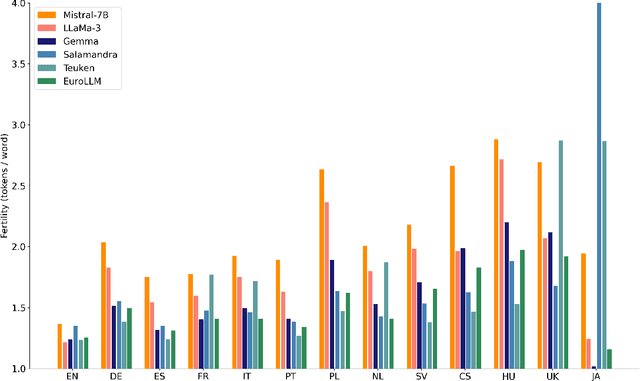
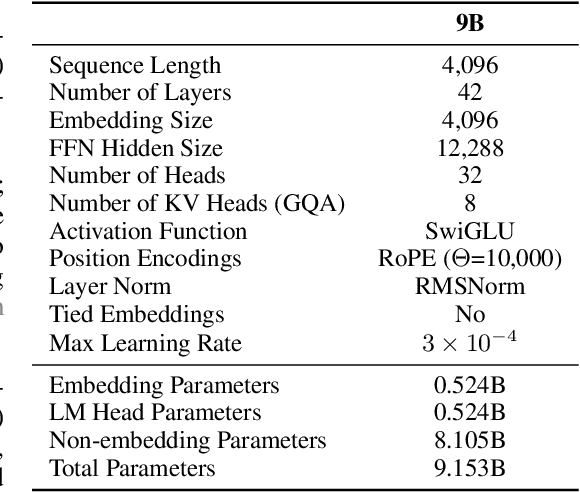
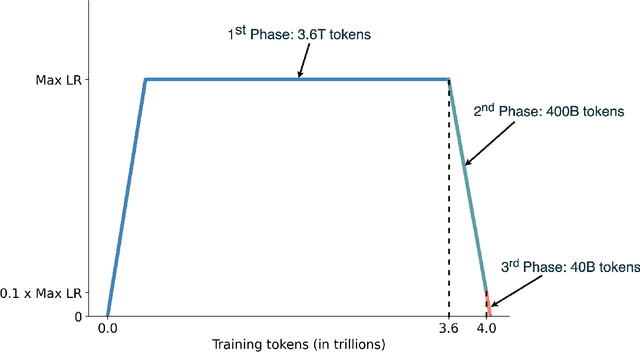
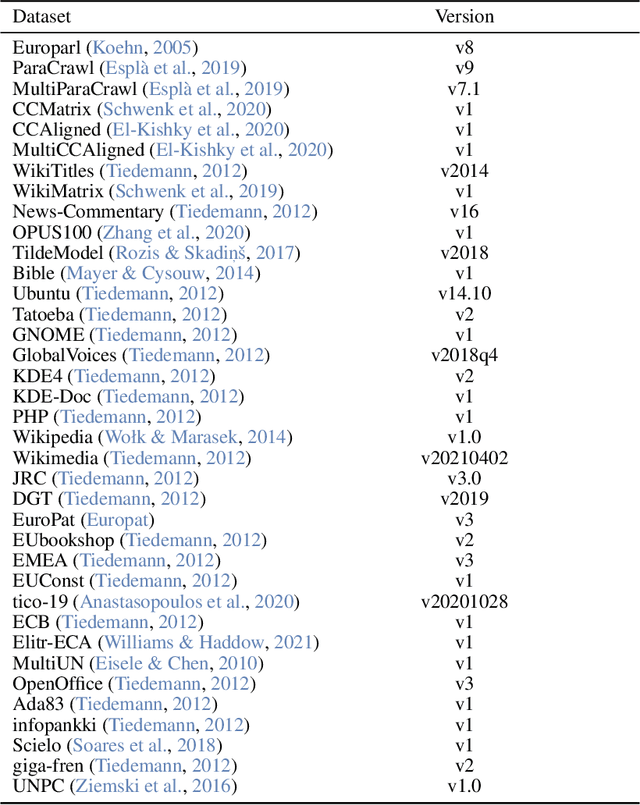
Abstract:This report presents EuroLLM-9B, a large language model trained from scratch to support the needs of European citizens by covering all 24 official European Union languages and 11 additional languages. EuroLLM addresses the issue of European languages being underrepresented and underserved in existing open large language models. We provide a comprehensive overview of EuroLLM-9B's development, including tokenizer design, architectural specifications, data filtering, and training procedures. We describe the pre-training data collection and filtering pipeline, including the creation of EuroFilter, an AI-based multilingual filter, as well as the design of EuroBlocks-Synthetic, a novel synthetic dataset for post-training that enhances language coverage for European languages. Evaluation results demonstrate EuroLLM-9B's competitive performance on multilingual benchmarks and machine translation tasks, establishing it as the leading open European-made LLM of its size. To support open research and adoption, we release all major components of this work, including the base and instruction-tuned models, the EuroFilter classifier, and the synthetic post-training dataset.
M-Prometheus: A Suite of Open Multilingual LLM Judges
Apr 07, 2025Abstract:The use of language models for automatically evaluating long-form text (LLM-as-a-judge) is becoming increasingly common, yet most LLM judges are optimized exclusively for English, with strategies for enhancing their multilingual evaluation capabilities remaining largely unexplored in the current literature. This has created a disparity in the quality of automatic evaluation methods for non-English languages, ultimately hindering the development of models with better multilingual capabilities. To bridge this gap, we introduce M-Prometheus, a suite of open-weight LLM judges ranging from 3B to 14B parameters that can provide both direct assessment and pairwise comparison feedback on multilingual outputs. M-Prometheus models outperform state-of-the-art open LLM judges on multilingual reward benchmarks spanning more than 20 languages, as well as on literary machine translation (MT) evaluation covering 4 language pairs. Furthermore, M-Prometheus models can be leveraged at decoding time to significantly improve generated outputs across all 3 tested languages, showcasing their utility for the development of better multilingual models. Lastly, through extensive ablations, we identify the key factors for obtaining an effective multilingual judge, including backbone model selection and training on natively multilingual feedback data instead of translated data. We release our models, training dataset, and code.
Zero-shot Benchmarking: A Framework for Flexible and Scalable Automatic Evaluation of Language Models
Apr 01, 2025Abstract:As language models improve and become capable of performing more complex tasks across modalities, evaluating them automatically becomes increasingly challenging. Developing strong and robust task-specific automatic metrics gets harder, and human-annotated test sets -- which are expensive to create -- saturate more quickly. A compelling alternative is to design reliable strategies to automate the creation of test data and evaluation, but previous attempts either rely on pre-existing data, or focus solely on individual tasks. We present Zero-shot Benchmarking (ZSB), a framework for creating high-quality benchmarks for any task by leveraging language models for both synthetic test data creation and evaluation. ZSB is simple and flexible: it requires only the creation of a prompt for data generation and one for evaluation; it is scalable to tasks and languages where collecting real-world data is costly or impractical; it is model-agnostic, allowing the creation of increasingly challenging benchmarks as models improve. To assess the effectiveness of our framework, we create benchmarks for five text-only tasks and a multi-modal one: general capabilities in four languages (English, Chinese, French, and Korean), translation, and general vision-language capabilities in English. We then rank a broad range of open and closed systems on our benchmarks. ZSB rankings consistently correlate strongly with human rankings, outperforming widely-adopted standard benchmarks. Through ablations, we find that strong benchmarks can be created with open models, and that judge model size and dataset variety are crucial drivers of performance. We release all our benchmarks, and code to reproduce our experiments and to produce new benchmarks.
Adding Chocolate to Mint: Mitigating Metric Interference in Machine Translation
Mar 11, 2025Abstract:As automatic metrics become increasingly stronger and widely adopted, the risk of unintentionally "gaming the metric" during model development rises. This issue is caused by metric interference (Mint), i.e., the use of the same or related metrics for both model tuning and evaluation. Mint can misguide practitioners into being overoptimistic about the performance of their systems: as system outputs become a function of the interfering metric, their estimated quality loses correlation with human judgments. In this work, we analyze two common cases of Mint in machine translation-related tasks: filtering of training data, and decoding with quality signals. Importantly, we find that Mint strongly distorts instance-level metric scores, even when metrics are not directly optimized for -- questioning the common strategy of leveraging a different, yet related metric for evaluation that is not used for tuning. To address this problem, we propose MintAdjust, a method for more reliable evaluation under Mint. On the WMT24 MT shared task test set, MintAdjust ranks translations and systems more accurately than state-of-the-art-metrics across a majority of language pairs, especially for high-quality systems. Furthermore, MintAdjust outperforms AutoRank, the ensembling method used by the organizers.
A Context-aware Framework for Translation-mediated Conversations
Dec 05, 2024Abstract:Effective communication is fundamental to any interaction, yet challenges arise when participants do not share a common language. Automatic translation systems offer a powerful solution to bridge language barriers in such scenarios, but they introduce errors that can lead to misunderstandings and conversation breakdown. A key issue is that current systems fail to incorporate the rich contextual information necessary to resolve ambiguities and omitted details, resulting in literal, inappropriate, or misaligned translations. In this work, we present a framework to improve large language model-based translation systems by incorporating contextual information in bilingual conversational settings. During training, we leverage context-augmented parallel data, which allows the model to generate translations sensitive to conversational history. During inference, we perform quality-aware decoding with context-aware metrics to select the optimal translation from a pool of candidates. We validate both components of our framework on two task-oriented domains: customer chat and user-assistant interaction. Across both settings, our framework consistently results in better translations than state-of-the-art systems like GPT-4o and TowerInstruct, as measured by multiple automatic translation quality metrics on several language pairs. We also show that the resulting model leverages context in an intended and interpretable way, improving consistency between the conveyed message and the generated translations.
EuroLLM: Multilingual Language Models for Europe
Sep 24, 2024Abstract:The quality of open-weight LLMs has seen significant improvement, yet they remain predominantly focused on English. In this paper, we introduce the EuroLLM project, aimed at developing a suite of open-weight multilingual LLMs capable of understanding and generating text in all official European Union languages, as well as several additional relevant languages. We outline the progress made to date, detailing our data collection and filtering process, the development of scaling laws, the creation of our multilingual tokenizer, and the data mix and modeling configurations. Additionally, we release our initial models: EuroLLM-1.7B and EuroLLM-1.7B-Instruct and report their performance on multilingual general benchmarks and machine translation.
xTower: A Multilingual LLM for Explaining and Correcting Translation Errors
Jun 27, 2024

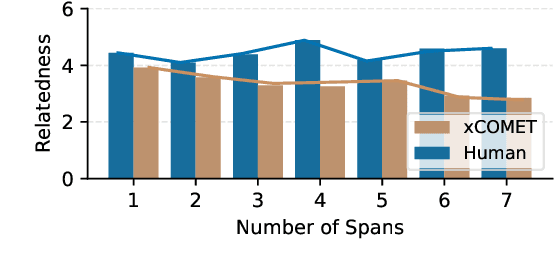

Abstract:While machine translation (MT) systems are achieving increasingly strong performance on benchmarks, they often produce translations with errors and anomalies. Understanding these errors can potentially help improve the translation quality and user experience. This paper introduces xTower, an open large language model (LLM) built on top of TowerBase designed to provide free-text explanations for translation errors in order to guide the generation of a corrected translation. The quality of the generated explanations by xTower are assessed via both intrinsic and extrinsic evaluation. We ask expert translators to evaluate the quality of the explanations across two dimensions: relatedness towards the error span being explained and helpfulness in error understanding and improving translation quality. Extrinsically, we test xTower across various experimental setups in generating translation corrections, demonstrating significant improvements in translation quality. Our findings highlight xTower's potential towards not only producing plausible and helpful explanations of automatic translations, but also leveraging them to suggest corrected translations.
Tower: An Open Multilingual Large Language Model for Translation-Related Tasks
Feb 27, 2024



Abstract:While general-purpose large language models (LLMs) demonstrate proficiency on multiple tasks within the domain of translation, approaches based on open LLMs are competitive only when specializing on a single task. In this paper, we propose a recipe for tailoring LLMs to multiple tasks present in translation workflows. We perform continued pretraining on a multilingual mixture of monolingual and parallel data, creating TowerBase, followed by finetuning on instructions relevant for translation processes, creating TowerInstruct. Our final model surpasses open alternatives on several tasks relevant to translation workflows and is competitive with general-purpose closed LLMs. To facilitate future research, we release the Tower models, our specialization dataset, an evaluation framework for LLMs focusing on the translation ecosystem, and a collection of model generations, including ours, on our benchmark.
 Add to Chrome
Add to Chrome Add to Firefox
Add to Firefox Add to Edge
Add to Edge